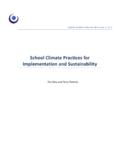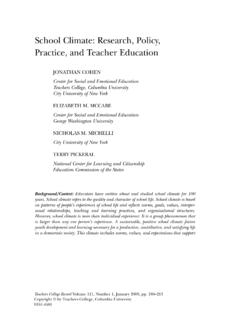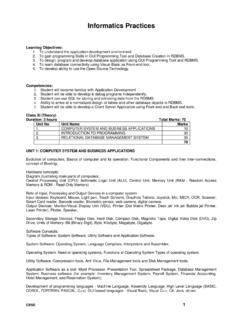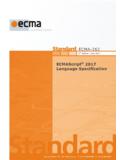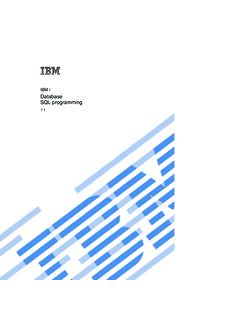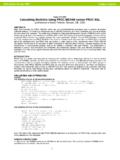Transcription of ANAGING AND HANDLING INDISCIPLINE IN …
1 Managing and HANDLING INDISCIPLINE in schools 85 MANAGING AND HANDLING INDISCIPLINE IN SCHOOLS A RESEARCH PROJECT ISABEL FREIRE, UNIVERSIDADE DE LISBOA JO O AMADO, UNIVERSIDADE DE COIMBRA ABSTRACT The research project we present here in (entitled GERLINDES, in Portuguese) is set out with the assumption that there is a link among the representations and the actions within the members of the interstitial groups of schools, the practices in action and social and disciplinary environment at schools.
2 This research project is focused on eight case studies held in schools of different grades, located in the centre of Portugal. Both qualitative (interviews and ethnographic observation) and quantitative methodologies (pupils questionnaires) have been used. KEYWORDS INDISCIPLINE ; School ethos ; Violence ; Case studies International Journal of Violence and School 8 Juin 2009 86 INDISCIPLINE GLANCED THROUGH A PEDAGOGICAL AND ORGANISATIONAL SCOPE School INDISCIPLINE has been, over time, an issue of concern for educators and we can even state that it has become a huge concern among educators, policy-makers and the public opinion in general, owing to the outbreak of aggressiveness among peers, violence within teacher-student relationship and vandalism, as well.
3 INDISCIPLINE is a multifaceted phenomenon, regarding its displays and causes, as well as its meanings and functions in the social, psychosocial and pedagogical fields. Concerning the displays, we believe that major situations are framed in what Amado and Freire (2009) points out as the first level of INDISCIPLINE : those incidents of disruptive nature whose disturbance affects the good classroom functioning . The incidents that might be framed in the second and third levels, are conflicts among peers and conflicts within teacher-student relationship , which might be taken on proportions of violence and even delinquency, the latter presents a minor frequency than the former (Amado, 2005).
4 Concerning the causes, we can distinguish, among others, those related to student s idiosyncrasies, his/her social and family context, external influences and of social, economic, cultural, generational nature, etc., those related to the personality and professionality of the teacher, and those associated with school as an organisation or the educational system as a whole. The social, psychosocial and pedagogical meanings and functions of these actions should take, primarily, in account the level within their displays are situated.
5 The contextual analysis of the actions of INDISCIPLINE , in a broader meaning, conferred herein, reveals that such behaviours are not always offensive (as general opinion does believe), but also defensive as a student s shield to protect his/her image and dignity , or as a strategy of maintenance and survival towards physical, psychic and moral rhythms and constraints of school and of the classroom (Amado, 2001). There are already many national and international scientific studies about this issue, approaching the pedagogical dimension and considering variables attached to the classroom; in Portugal, empirical researches considering school as whole are lacking.
6 Since the pioneer study of Rutter et al. (1979), a lot of authors have emphasised the link between the display of disciplinary problems (including violence) and the ethos which is being lived inside schools. Managing and HANDLING INDISCIPLINE in schools 87 This ethos or school environment (Blaya, 2002) linked to cumulative effects of a set of variables is translated into attitudes, values, behaviours and practices that become a distinctive mark of the school as a whole and is closely rooted in interpersonal relationships that are made between the various protagonists of a school, individually and collectively is (Freire, 2001).
7 In the present project, we intend to emphasise, the factors connected with school as organisation and the relational climate within it. We will also be attentive to the fact that, nowadays, Portuguese schools are enlarged organisations1, what turns their functioning and interpersonal relationships more complex and brings up a new and unexplored field of study and research. Schools are complex, formal organisations that, as such, include behaviours of diverse actors, organised and interconnected by a structure of authority and a network of relationships that allow partial and unfinished information, resources and products pass from one group to another" (Bates and Murray, 1981, 58).
8 According to these authors, school is structurally grouped in two kinds the "elementary groups" and the "interstitial groups". The former constitutes basic structural elements or social units (for example, the class, the group of teachers of a certain subject or field of knowledge, the administrative sector, etc.), while the latter, formed by the representatives of the elementary groups, are connexion groups which origin a network of links in the system s structure (for example, the pedagogical council, the school and/or school group assembly, the class councils, the board of the parents association).
9 It is inside these interstitial groups that the contact between the members of the isolated elementary groups is established. Research has not given much attention to the role of the interstitial groups, although the organisation of schools in the Portuguese educational system assigns them a strong leading role. The organisation of these groups, established in Portuguese schools, holds a potential of collective work to promoting a favourable school environment to students learning and teachers professional development, which has not been well used in many of them, particularly those more troublesome.
10 Moreover, school organisation in enlarged groups creates another structural level and new relational dynamics that leads to a complexity of networks and the appearance of new connexion groups whose reflection on schools functioning, urges to be acquainted with, particularly, in the disciplinary field. 1 Portuguese schools are organised in clusters of schools of different levels of education, with joint leadership and management. International Journal of Violence and School 8 Juin 2009 88 So, we consider vital, starting from the hypothetical assumption that, what happens in the interstitial groups and how decisions are made within them, are perceived in the elementary groups (namely in class and in teachers councils), what constitutes essential aspects of school s life understanding, particularly, its relational and disciplinary dimensions.

